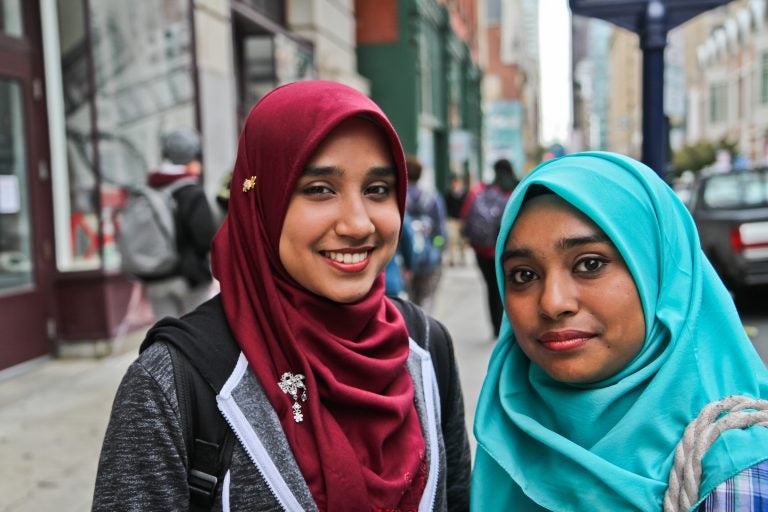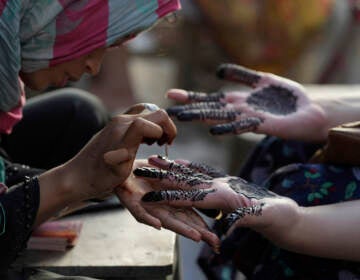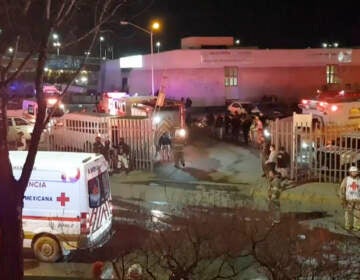Rohingya refugees resettled in Philadelphia find freedom that was worth the journey
Considered the most persecuted ethnic minority in the world, Rohingya Muslims have fled Myanmar by the thousands in recent years. Some now call Philadelphia home.
Listen 3:42
Sisters Faridah, and Noor Fauziah Rashid fled Malaysia as refugees and resettled in Philadelphia. (Kimberly Paynter/WHYY)
When Noor Fauziah Rashid first came to the United States, she found some things downright baffling.
Like her Walmart coworkers, asking her if she’d gotten a customer’s phone number.
“They said: ‘Did you take the digit? I said: ‘What digit?!’ ” she recalled, giggling at the cultural gaps that can make slang so confounding.
Now, 15 months after Rashid, 22, and her older sister and brother fled Malaysia as refugees and resettled in Philadelphia, they feel more at home here — in one very key way — than they ever did in southeast Asia.
“I feel more freedom” here, said Noor’s sister Faridah, 25. “I can be who I want to be.”
Most of all, they revel in the simple things, like walking down the street alone, working, and going to school. As Rohingya Muslims, they weren’t allowed to do any of those things in Malaysia, where they were denied citizenship. They say they felt like outcasts.
Most persecuted minority
More than one million Rohingya Muslims live in southeast Asia, most in ghetto-like camps in Myanmar’s poor coastal state of Rakhine, where they lack even basic services and opportunities and are forbidden to leave. They’ve long been reviled as illegal immigrants in the majority Buddhist country, where they’ve lived stateless for more than 30 years.
But deadly military crackdowns in recent years have led humanitarians to declare Rohingya Muslims the world’s most persecuted minority, and Myanmar’s treatment of them, ethnic cleansing.
That has created a refugee crisis, with more than 600,000 Rohingya Muslims fleeing Myanmar in recent years, and most resettling in Bangladesh, Malaysia, and other nearby Middle Eastern and Asian countries.
Still, some — like the Rashid siblings – have ventured much farther.
HIAS-Pennsylvania and the Nationalities Services Center welcomed Noor, Faridah and their brother Mohamad Fairuz bin Rashid, 24, to Philadelphia in September 2016. “That was our first flight in our entire life!” Faridah laughed, of the 22-hour journey to Philly.
Officials at the NSC, HIAS-PA, and other local refugee resettlement agencies, aren’t sure how many Rohingya have made Philly their new home. But they agree it’s a small community, numbering just a few dozen, that’s centered in South Philadelphia.
While conditions are slightly better for Rohingya in Malaysia than in Myanmar, Rohingya refugees have no legal status there, so they can’t work or go to government-run schools. Women and children especially have limited rights.
“The Malaysian government doesn’t recognize us as citizens. I born there. I grew up there. (But) even though I have birth certificate, they don’t recognize me as their people. So I can’t do any business. You can’t even have a driving lesson. They don’t even recognize you at all. Basically we do nothing (there),” said Faridah, who was born in Kuala Lumpur. “United States, even though I’m not born here, they give me opportunity.”
Working their way toward U.S. citizenship
The siblings have applied for green cards. If they get them, after waiting five years, they can apply for citizenship. They also hope their grandmother and uncle, who raised them, and other relatives will eventually move here, too.
The siblings spoke some English when they arrived, but have become more confident and fluent English speakers in Philadelphia — although they learned British English in Malaysia, which sometimes still causes confusion.
“I grew up calling flour as ‘fla.’ When I go to shop (here), I say: ‘I need fla. Do you have fla?’ They were looking at me: ‘What is fla?’ I say: ‘The white powder you mix and make it cake!’ They say: ‘Flour!’ I say: ‘I don’t want any flour! I want fla!’ ” Faridah said, laughing now at the misunderstanding.
American holidays, from Columbus Day to Halloween, also could be confounding.
“The Halloween! I get two different answers from my friends. I ask one of my friends: ‘How’s your Halloween preparation?’ ‘No, I don’t celebrate Halloween.’ I say: ‘Why?’ ‘Oh no, it’s like devil’s birthday. We don’t celebrate devil’s birthday!’ OK. I ask the other friend. She has been busy shopping (for) costumes for her kids, candies. Two different answers. I found out one is worshipping the devil, one is not worshipping the devil! Back in Malaysia, we don’t have Halloween.”
The weather has taken some adjustment, as well.
“Cool! Freezing cool! In Malaysia, it’s only rain and sunny, that’s it,” Faridah said.
Still, don’t confuse their wonder for complaining.
The siblings talk about life here as kids might gush about an amusement park.
“I really appreciate the United States, because they accept us and let us come down here to achieve our dreams,” Faridah Rashid said.
Faridah dreams of becoming a teacher.
In Malaysia, she only went to school for six years, because her family couldn’t afford the fees to keep her enrolled in private school. Afterward, she worked secretly as an assistant teacher in a primary school, using that income to ensure that Noor could stay in school until she got her degree. Noor worked in the back room of a pharmacy in Malaysia. She wants to go into nursing here.
In Philadelphia, one of the first things the sisters did was enroll in school. Faridah now is pursuing a GED and plans to study education in college, while Noor is studying nursing at the Community College of Philadelphia. Both sisters also work at Walmart.
“We can have a bright future over here,” Noor said. “We can be what we want. And also we can support our family as well as our community here.”
WHYY is your source for fact-based, in-depth journalism and information. As a nonprofit organization, we rely on financial support from readers like you. Please give today.




